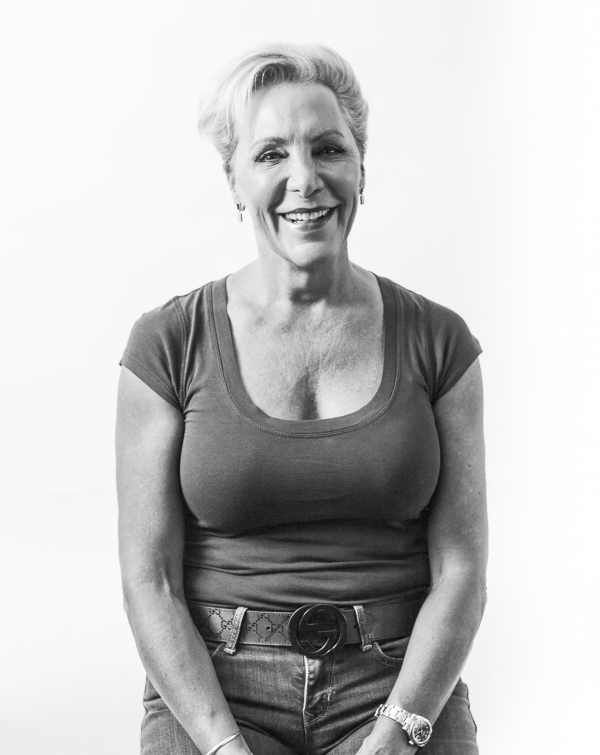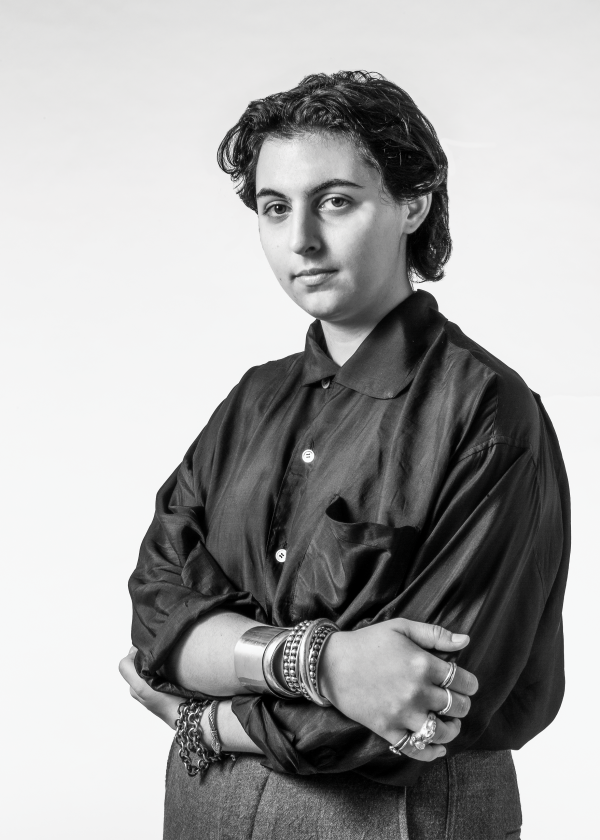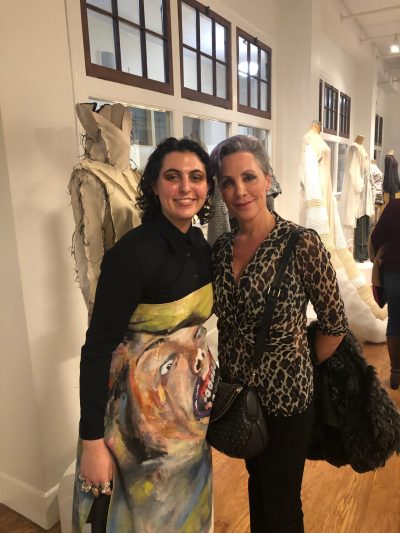
Photography by Jehadu Abshiro.

Photography by Vonda K Portraits.
Maria and Myah Hasbany take the phrase “like mother, like daughter” to a whole new level. Maria is the District 9 appointee to the Park and Recreation Board while Myah is studying fashion at London’s Central Saint Martins. But both are passionate about making an impact in their communities. Volunteering has played a significant role in Maria’s life since she stepped away from the corporate world in 2004. She served on seemingly every PTA and SBDM in the Woodrow Wilson feeder pattern, and then at Booker T. Washington, where Myah graduated last year. Myah may be a newcomer to the fashion world, but she’s already making a statement with showstopping pieces of knitwear. The voluminous outfits caught the attention of East Dallas icon and fellow Booker T. alumna Erykah Badu, who commissioned custom pieces that she wore during her online concerts.
WHAT’S FIERCE ABOUT EACH OTHER:
Myah: I think what’s fierce about you is that you will do what you think is right even though it might make some people dislike you. I really admire that you don’t do things just because people expect you to or because that’s what everyone else would do.
Maria: You’ve chosen an outlet that a lot of people aren’t familiar with or comfortable with, and you have to explain and validate yourself. It’s hard to put yourself out there knowing that you’re going to get feedback that isn’t always lovely. I think that takes courage to put yourself out there in such a vulnerable way and push the boundaries.
ON INSPIRATION:
Myah: I’m a very anxious person, so I always need to be doing something. My inspiration comes from that, as negative as that sounds. In terms of dealing with anxiety, it’s a pretty good way. I’m putting something into the world. Every project is specific, so it’s hard to be like, “I like this one thing.” I like 50 things, and I funnel it into one major theme per project. In art school, you have to explain everything in detail. Sometimes you just make stuff because it’s fun, and that’s OK. Sometimes you make really bad stuff, and that’s OK too because it’s fun.
HER FAVORITE PIECE:
Myah: My favorite one was the dress I had my mom model with our dogs. It was the first time I really tried the style I still have now that was executed to the vision I wanted. I allowed myself to do something, not knowing where it was going to go or if it would work out. That’s the one piece I’ve made that most people make fun of me for. It looks like something, and I’m not going to say what it is, but part of my work is admitting to the fact that this looks super ridiculous. It has no function. It’s out there. It’s crazy. That was the first time I admitted that and embraced that, and that is super important.
Maria: There’s a reason we call it the ball dress. You made a series around that, and it broke the ice with Erykah Badu. It connected with an artist you really respect.
WORKING WITH ERYKAH BADU:
Myah: She is so ethereal. She’s the only person I’ve ever met who has been able to look at my work and go, “Yep, I get it. You don’t need to explain it. You don’t need to tell me why you made it.” That was so important to have someone like that. You want someone to take you seriously, push you and respect your craft. Working with her those few months was the most productive I’ve ever been because I was so excited to be working with someone like that. It was such a nurturing environment.
SERVING ON THE PARK BOARD:
Maria: My friend Paula Blackmon asked if I would be interested. I’m a huge supporter, so I said yes without really knowing what it was. Come to find out, it’s a very large and passionate community. There’s a tremendous amount of communication that goes on with all the groups. The biggest challenge is the sheer amount of work. I need to be educated about parks, rec centers, tennis courts, lakes and everything that comes in front of the board to vote on. That’s a part I didn’t expect, but I love it.

ON VOLUNTEERING:
Maria: When something isn’t right, it just makes me mad. Somebody needs to do something about that. Oh, wait, that’s me. Since I stopped working in the traditional world, volunteerism has been what I’ve done. I was in a beautiful neighborhood in a school system that everyone had abandoned. I used to say I was the hardest working unpaid employee in DISD. I was lucky to be in a position to give back in that way. That’s the biggest challenge with all of our volunteer roles. The folks who are motivated and super qualified don’t have the time to do it. Once you start, it’s so rewarding, not only because you see change being effected, but you find like-minded people.
ON CRITICISM:
Myah: I’ve had to adjust how I see criticism. Just because someone in a higher position says something to you, that doesn’t necessarily mean it’s right or that you should take that advice. What do I need to do to not sacrifice my vision in taking this criticism?
Maria: My favorite thing to do is compose a raging email and never send it. My favorite thing to say is, “I would love to speak with you in person.” Most people will not be quite as harsh or critical in person.
WORKING ON THE STORE EULOGY VINTAGE:
Maria: We enjoyed shopping together and working together. As different as we are in temperament, we’re pretty good about working out problems. I’ll typically defer to her on (aesthetics) because she has far more talent, and she defers to me on the business part. I think it was important for her to see the nuts and bolts (of a business). It’s great to have an idea and make something amazing, but how much did it cost? How long did it take to sell? One of my secret motivations was to put her in an environment where she had to talk about herself and her work with people who aren’t friends and family that would automatically love and adore her. You have to know how to sell yourself because art is weird. It’s not about the thing, but the connection you make with that person.
Myah: You’ve always talked to me as an adult, even when I was a kid, so I was able to communicate with people from a young age. So much of what I do to the average person is super weird. Even people in the fashion world haven’t understood it. Having some ability to explain where I’m coming from and what it means has been really effective. If I immediately said, “Screw you. I’m an artist. This is what I do,” I wouldn’t have connected with as many people if I didn’t have that patience and practice.
ON GENDER DISCRIMINATION:
Myah: I think a lot about if I was a man, where would I be now? I’d be much farther than I am now. I can definitely say that. Fashion in general is not seen as a serious thing. If you’re going to school for fashion, you’re going to mess around. People have this expectation that you’re just putting on makeup to walk down a runway. People have passed me off because of that. In reality, you work super hard. I don’t look traditionally feminine and dress weird for any gender. People don’t know how to categorize me.
Maria: Probably being paid less or being declined for a job, but in a real personal way, no. I’ve worked in male-driven industries — on the trading desk, valet parker, precious metals. I’m just a tough chick. People don’t mess with me.
To read more about our 2021 fierce females, click here.





